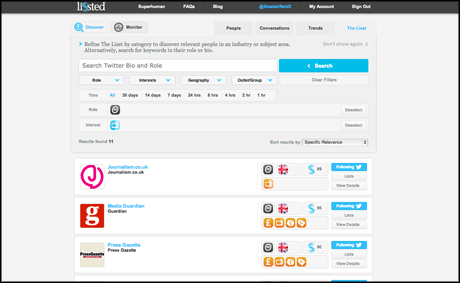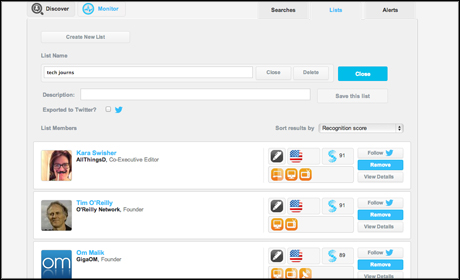
Tool of the week: Lissted
What is it? A searchable database of influential and recognised Twitter accounts based on real world importance and online interaction.
How is it of use to journalists? Filtering out the noise of social media is a constant struggle for journalists, so Lissted collects the most relevant and recognised Twitter voices into a searchable database.
The platform originally launched as a database of journalists and their specific beats, but through manual curation the Lissted team expanded the list to prominent politicians, analysts, commentators and organisations.
They then built an algorithm into their own list of people to see who they follow and interact with, creating an ever-growing, searchable database of Twitter accounts organised by their role and field.
The platform operates on a freemium basis but for journalists and Twitter accounts on the 'Lisst', of which there are 48,000 accounts and growing, some of the features are freely accessible and extended features are discounted.
The Lisst
Accounts on The Lisst are categorised by their role, interests, geography or organisation and users can search for any combination of these, as well as an open search of the accounts' Twitter bio or role.
So when searching for "media outlets" as the role and "journalism" as the interest, Journalism.co.uk tops the list in terms of "specific relevance", but Media Guardian has a higher "recognition score" in terms of how many other accounts on the Lisst follow that specific account.

Screenshot from Lissted.com, showing the search function
Taking the process further, you can also search for relevant academics or analysts in various fields if you need expert commentary for a story.
In terms of sourcing stories, Lissted also offers a number of possibilities.
You can search the database for "conversations" – tweets on specific topics from specific types of people – or view trending topics that, again, can be whittled down to niche areas. So, dependent on your specific beat, you can monitor what your sources or audience are talking about to gather new story ideas.
Accounts already on the Lisst, which can extend to organisations, can access these elements of the tool – searches, conversations and trends – for free. If you are not on the list at first, like myself, your organisation or outlet should be and you can access these other free options through that channel. Signing up and paying for further access does provide more options for personalisation and ease of use though.
You can create your own lists determined by specific search criteria and export these to Twitter itself, for use in Tweetdeck or other relevant platforms. This could be particularly useful for journalists covering specific beats as it could flag up previously unknown voices or sources to be monitored in the future.
You can also set up email alerts, based on searches of keywords, categories, or combinations of those criteria and a frequency for how often the alerts are sent, be it hourly to a news desk or daily to a personal account.

Screenshot from Lissted.com, showing the exportable twitter lists
Lissted is still growing as a database of the most relevant and prominent Twitter accounts. The algorithm can predict an account's interest areas and relevance by its interactions with other members of the database, but an account's 'role' needs to be manually entered and categorised by the Lissted team.
This can have implications for some search results, in the current early stage of the tool's development. US House Speaker John Boehner has been added to the Lisst by the algorithm, for example, but has yet to be assigned a role and so would not appear in searches for politicians.
Lissted users can flag this up to the team with a 'categorise' button, and search through as-yet-uncategorised accounts by their interest, but the Lissted team is working to keep up with demand.
The English language dominates Lissted and the geographical search function is limited to the US, UK and 'rest of the world' but founder Adam Parker assured Journalism.co.uk that this is an element to be developed. He also added that an app "is on the roadmap" to bring the functions to mobile.
Free daily newsletter
If you like our news and feature articles, you can sign up to receive our free daily (Mon-Fri) email newsletter (mobile friendly).
Related articles
- How AI can help journalists track MPs financial interests
- Tools for journalists: Missing Perspectives Directory, for connecting newsrooms with women
- Fact-based journalism is under attack. What can we do about it?
- 15 online communities for journalists you should know about
- Seven sources of free images for journalists









